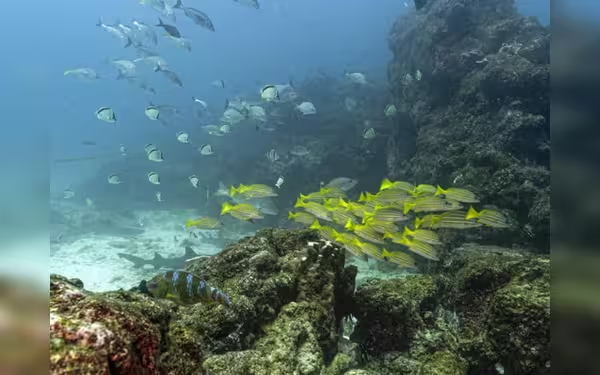Sunday, November 17, 2024 12:24 AM
Oceans Approaching Critical Acidification Level: Urgent Report
- Oceans nearing critical acidification levels.
- Immediate action needed to reduce carbon emissions.
- Ocean health directly impacts human livelihoods.
 Image Credits: tribune.com.pk
Image Credits: tribune.com.pkA report warns that the world's oceans are nearing critical acidification levels, threatening marine life and human livelihoods.
The world's oceans play a vital role in maintaining the balance of life on our planet. They not only provide a habitat for countless marine species but also help regulate the Earth's climate. However, a recent report has raised alarming concerns about the health of our oceans. According to the Potsdam Institute for Climate Impact Research (PIK), the oceans are nearing a critical level of acidification, which could have devastating effects on marine life and climate stability.
Acidification occurs when carbon dioxide (CO2) from the atmosphere dissolves in seawater, leading to a decrease in pH levels. This process can harm marine organisms, particularly those with calcium carbonate shells or skeletons, such as corals and shellfish. As the oceans absorb more CO2, the water becomes more acidic, making it increasingly difficult for these creatures to survive and thrive.
The PIK report outlines nine key factors that are essential for the oceans to sustain life. These factors include temperature, salinity, and nutrient levels, all of which are being affected by climate change and human activities. The report emphasizes that if we do not take immediate action to reduce carbon emissions, we risk pushing our oceans past a tipping point where recovery may be impossible.
It is crucial for everyone to understand the implications of ocean acidification. Not only does it threaten marine biodiversity, but it also impacts human communities that rely on fishing and tourism for their livelihoods. The health of our oceans is directly linked to our own well-being, making it imperative that we act now to protect these vital ecosystems.
The findings of the PIK report serve as a wake-up call for all of us. We must recognize the interconnectedness of our actions and the health of our oceans. By making conscious choices to reduce our carbon footprint and support sustainable practices, we can help ensure that our oceans remain a thriving environment for generations to come. The time to act is now, for the sake of our planet and all its inhabitants.













